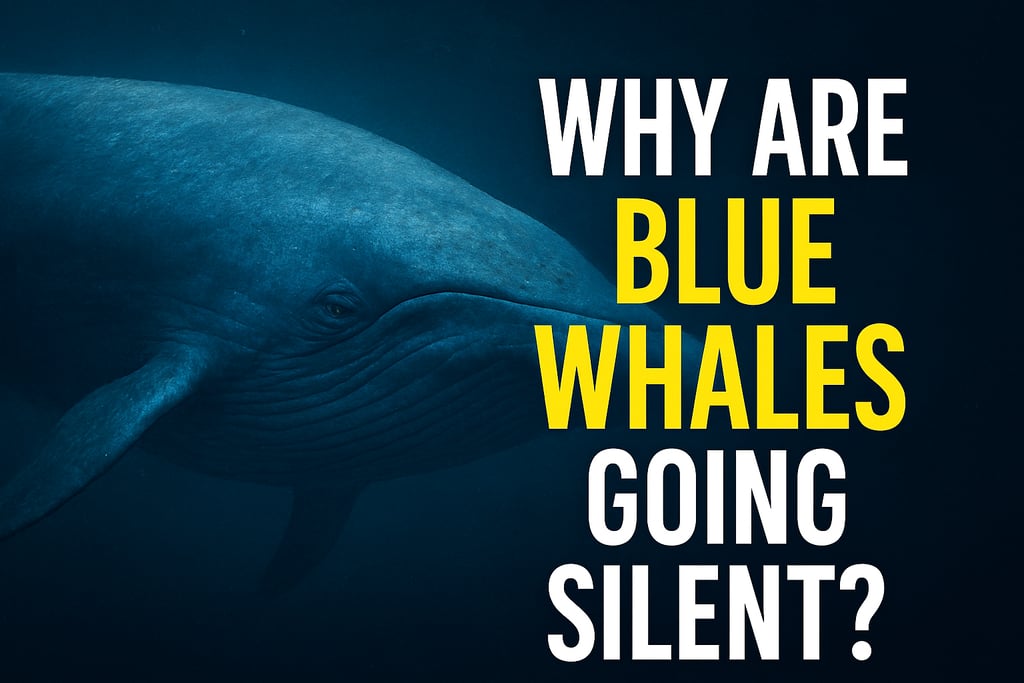CURIOSITY solved
What does it mean when blue whales go silent?
When blue whales go silent, it's not just a biological curiosity—it’s a distress signal from the ocean itself. Here's what scientists have uncovered:
NATURE
8/7/20252 min read


When blue whales go silent, it's not just a biological curiosity—it’s a distress signal from the ocean itself. Here's what scientists have uncovered:
🐋 What Does Whale Silence Mean?
Blue whales are known for their deep, resonant songs that travel hundreds of miles underwater. These vocalizations are essential for:
Mating rituals
Navigation across vast ocean territories
Social communication
A sudden drop in these songs—nearly 40% less vocalization in recent years—is deeply concerning. It’s not because they’ve simply stopped singing. It’s because they’re too exhausted and undernourished to sing.
🌊 The Underlying Causes
The silence is tied to a cascade of environmental stressors:
Marine heatwaves, especially one dubbed The Blob, raised ocean temperatures by over 4.5°F across thousands of miles.
This warming disrupted ocean currents and led to massive die-offs of krill and anchovies, the primary food sources for blue whales.
Toxic algae blooms flourished in the warmer waters, causing widespread poisoning of marine mammals.
Noise pollution from ships and sonar further interferes with whale communication, sometimes forcing them to flee or go silent.
As oceanographer John Ryan put it:
“It’s like trying to sing while you’re starving.”
🌡️ The Main Culprit: Marine Heatwaves
A prolonged marine heatwave known as “The Blob” (2013–2016) raised ocean temperatures by over 4.5°F across thousands of kilometers. This triggered:
• Massive die-offs of krill and anchovies, the whales’ primary food
• Toxic algae blooms, causing the largest marine mammal poisoning ever recorded
• Nutritional stress, leaving whales too weak to sing
As oceanographer John Ryan put it:
🔊 Noise Pollution Adds to the Silence
Human activities are flooding the oceans with low-frequency noise:
• Shipping traffic
• Naval sonar
• Offshore drilling and construction
This noise overlaps with whale song frequencies, forcing whales to either shout louder (which drains energy) or go silent altogether.
⚠️ Ecological Consequences
The silence of blue whales is more than acoustic absence—it’s a warning of ecosystem collapse:
• Less singing means fewer successful matings
• Reduced communication can lead to higher calf mortality
• Whales play a key role in carbon cycling and nutrient distribution
Marine biologist Kelly Benoit-Bird warns:
🌍 A Global Pattern
This isn’t isolated to one region. Similar declines in whale song have been observed in:
• The South Pacific
• The Southern Ocean
• Coastal areas near Argentina.
It’s a global distress call from the ocean’s largest inhabitants.
🔍 Why It Matters
Blue whales are not just majestic creatures—they’re sentinels of the sea. Their silence is a signal that the ocean is struggling. And if the largest animals on Earth are too weak to sing, it’s time we listen more closely.
Would you like to explore how whale songs are recorded or how climate change is affecting other marine species?
A significant decline (up to 40%) in blue whale vocalizations has been observed off California and other regions, especially following marine heatwaves such as "The Blob" that started in 2013. These heatwaves disrupt the whales’ main food source (krill), sometimes causing toxic algal blooms and the collapse of prey populations. As a result, blue whales "go silent" .
In summary, blue whale silence is an alarming sign of severe environmental stress, most directly tied to marine heatwaves and associated food shortages. This silence is considered a warning about the broader health of the ocean ecosystem.
